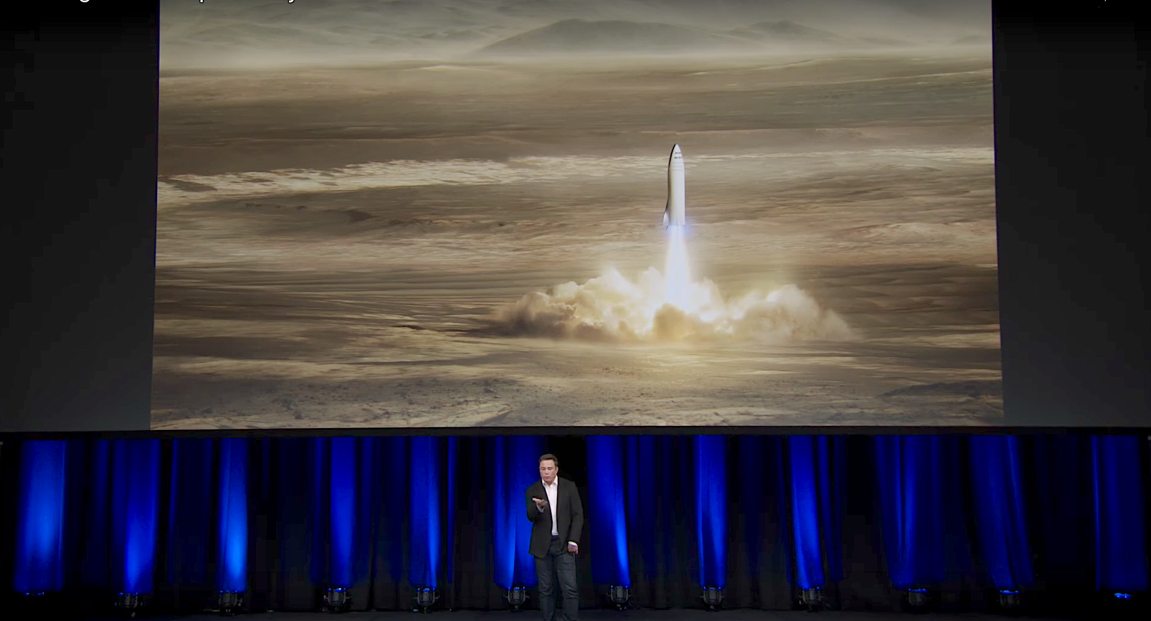
Ask Me Anything
Saturday on Reddit, Elon Musk took to Reddit to join a massive internet audience in an AMA (ask me anything) questions thread to follow up on his International Aeronautical Congress (IAC) 2017 presentation. While Musk is typically candid and open about the progress of his various endeavors, he dedicated the AMA time and space to take questions specifically related to the IAC presentation — namely, what SpaceX is working on. As such, most of the questions users posed (and the ones he answered) were of a technical nature, though the mood was still lighthearted.
Rocket Science
One of the first questions, collected on the r/SpaceX subreddit leading up to the AMA, was about the Raptor’s thrust. It was one of the highest ranked questions at the AMA’s outset, and the first Musk answered.
Another question wondered just how the dry mass and thrust of the rockets would affect their return to Earth — namely, whether they would land by “hover-slam.” Musk responded that “Landing will not be a hoverslam,” and explained that the thrust to weight ratio will actually “feel quite gentle” and that as the ratio of thrust to weight at launch (also around 1.3) it will “pretty much look like a launch in reverse. . .”
Musk also provided some insight into the design of the rockets, and gave some context as to their design’s function and purpose. When one user asked about how the BFS will manage the temperature of propellents in zero gravity, Musk explained the venting procedure — adding that a cryocooler could be added in the future.
When user CMDR-Owl asked about what progress we’ll see in terms of development and testing over the next five or so years before SpaceX’s first planned launch, Musk explained that they’ll be starting “with starting with a full-scale Ship doing short hops of a few hundred kilometers altitude and lateral distance,” adding that:
Next step will be doing orbital velocity Ship flights, which will need all of the above. Worth noting that BFS is capable of reaching orbit by itself with low payload, but having the BF Booster increases payload by more than an order of magnitude. Earth is the wrong planet for single stage to orbit. No problemo on Mars.
3D printing has already become beneficial to many industries, and naturally the question or whether it will benefit rocket production was a good one to ask. Musk responded that although most of the Raptor’s parts will be machine forged, some could be 3D printed.
Life on Mars
Speaking on life on Mars, while the focus was mainly on the rocket technology that will get us to there (and potentially elsewhere), users did have questions about what SpaceX needs to do to ensure that when we get to the Red Planet, we’ll be able to survive. Reddit user foxyjim99 asked about considerations such as food (namely, how you would calculate the amount needed for a mission and ensure that the need is met) — vitally important, but admittedly not something that SpaceX has as a primary focus. Musk responded that “Our goal is get you there and ensure the basic infrastructure for propellant production and survival is in place,” comparing the work that SpaceX is doing is roughly analogous to building “the equivalent of the transcontinental railway” — and as for terraforming Mars to make (and keep) it habitable, other companies and millions of people will need to be involved.
To that end, when user adammrxifgnqph asked if there were plans to send up additional satellites before the Mars mission, to facilitate communication, another user jumped in to ask about Mars-to-Earth communication. Musk’s response? “If anyone wants to build a high bandwidth comm link to Mars, please do.” Whether meant in jest, a challenge, or a call to action, user general-information pointed out that the concept interplanetary transmission is pretty cool. Musk responded to the user’s thoughts with an eloquent “Nerd,” but then offered a few more thoughts — ensuring us that when we go to Mars, we’ll probably be able to brag on social media about it.
The AMA was definitely a treat for those interested in the technical aspect of designing and building the rockets, but Musk didn’t keep it too serious:
Elon Musk is clearly not your typical CEO. Not only is he, through SpaceX, attempting feats of space travel and exploration never before attempted, but he’s communicating with the public about his efforts with a level of transparency that’s very atypical. There are some who think that Musk’s ambitious plans of getting to Mars within the near future are impossible — or at the very least, not probable. But whether or not SpaceX is able to accomplish exactly what they are intending, Elon Musk is proving that everyone is invited to be included in that process.